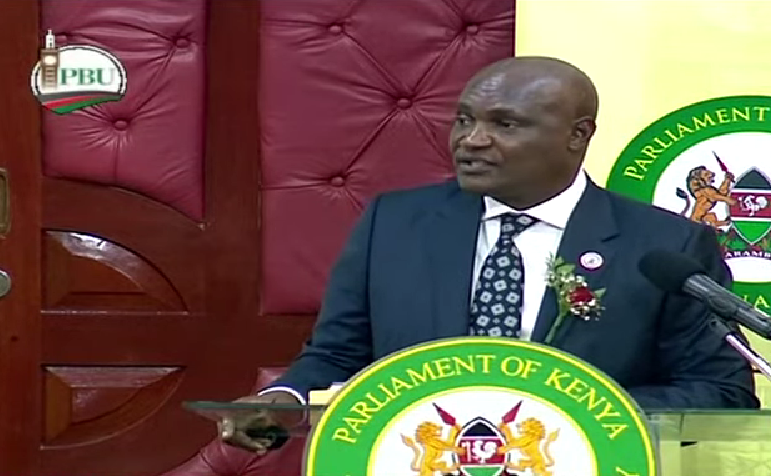 Treasury CS John Mbadi during budget reading on June 12, 2025. /SCREENGRAB
Treasury CS John Mbadi during budget reading on June 12, 2025. /SCREENGRABThe Kenya Kwanza government has maintained the trend of prioritising
education by allocating the sector the lion’s share of the 2025–26 national
budget.
This is Sh44.5 billion more than the Sh656.6 billion allocated in the 2024–25 financial year, which accounted for 27.6 per cent of the Sh3.92 trillion total expenditure.
In the 2023–24 financial year, the sector received Sh628.6 billion – 27.4 per cent of the national budget.
That was an increase of Sh84.2 billion from the Sh544.4 billion allocated in 2022–23.
The substantial funding is aimed at supporting school capitation for primary, junior schools, TVET, and university institutions.
It will also cover the salaries of teachers, instructors, and lecturers, along with the development and expansion of educational facilities.
While presenting budget estimates and revenue raising measures in the National Assembly on Thursday, June 12, National Treasury Cabinet Secretary John Mbadi said the proposed allocation includes Sh387.2 billion to the Teachers Service Commission (TSC).
The amount represents Sh29 billion increase from the Sh358.2 billion the commission was allocated in the 2024-25 fiscal year.
Mbadi said the TSC allocation includes Sh7.2 billion for recruitment of intern teachers and Sh980 million for capacity building of teachers on the Competency-Based Education (CBE).
In the 2024-25 budget, the Treasury allocated Sh13.4 billion for conversion of 46,000 Junior Secondary School intern teachers to permanent and pensionable terms.
The then Treasury CS Njuguna Ndung'u allocated Sh1.3 billion for training teachers in the CBE.
Mbadi said free primary education has been allocated Sh7 billion, Sh28.9 billion for Junior schools’ capitation and Sh51.9 billion for free day secondary education.
Comparatively, Basic Education got a total allocation of Sh142.3 billion in last year's budget, comprising Sh9.1 billion for free primary education, Sh61.9 billion for free day secondary education while Junior secondary schools got Sh30.7 billion for capitation.
The CS said he has proposed the allocation of Sh5.9 billion for the administration of national examinations.
While Mbadi said no funds had been allocated as exam waiver, he assured the country that all candidates will sit examinations this year at no cost.
However, he said the government will have to consider cost-sharing in funding examinations next year owing to projected Sh970 billion revenue deficit.
Whereas the proposed national budget stands at Sh4.291 trillion (22.3 per cent of GDP), projected revenue collection for the 2025-26 financial year is Sh3.321 trillion, equivalent to 17.2 per cent of GDP.
"While we are cognizant that examinations are to be conducted as scheduled this year, there's need to undertake a critical evaluation of the costing of examination and asses the sustainability of the programme in view of prevailing fiscal constraints and explore optimal options for delivering national examinations in order to ensure economic and value for money in public spending," Mbadi said.
He said it's no longer sustainable to extend blanket exam waiver whilst only a few learners are from vulnerable families.
Mbadi said there's need to explore cheaper ways of funding national exams without compromising their quality or integrity.
"To this end, the National Treasury is in consultations with the Ministry of Education on how best to achieve this at a minimal cost possible, including evaluating cost-sharing mechanisms."
Last year, Treasury allocated Sh5 billion as exam waiver fee.
Meanwhile, Mbadi said the school feeding programme received Sh3 billion while Sh4 billion will go to Technical, Vocational, Educational Training and Entrepreneurship project.
TVET institutions got Sh30.7 billion in the 2024-25 financial year.
Mbadi said Sh1.7 billion has been allocated for infrastructure development for primary and secondary schools received while Sh1.4 billion will go towards the construction and equipping of TVET institutions and vocational training centres.
Last year, CS Ndung'u allocated Sh3.2 billion for infrastructure development in both primary and secondary schools.
He set aside another Sh1 billion for the construction of JSS classrooms and Sh2.3 billion for construction and equipping of TVETs.
The Kenya Primary Education Equity in Learning programme was allocated Sh13.3 billion while Sh2.3 billion went to the Kenya Secondary School Quality Improvement project.
Last year, the Equity in Learning programme received Sh11.1 billion while the Kenya Secondary Schools Quality Improvement project got Sh1.5 billion.
Other proposed allocations in the Ministry of Education include Sh993 million for Research, Science and Technology Innovation and Sh41.5 billion to the Higher Education Loans Board (Helb) for provision of loans to university and TVET students.
The Helb allocation is an increase from Sh35.9 billion allocated in the 2024-25 financial year.
In the 2024-25 budget, Research, Science and Technology Innovation recieved Sh1.1 billion while Sh1.8 billion went toward the construction of integrated resource centres for learning.
Scholarships for university students was allocated Sh16.9 billion, Sh7.7 billion capitation for TVET students.
Last year, the amount stood at Sh16.9 billion while capitation and scholarships for TVETs was allocated Sh7.7 billion.
Whereas Mbadi did not mention the allocation for the Digital Literacy Programme and ICT integration in Secondary Schools, Treasury allocated Sh360 million in the 2024-25 fiscal year.









